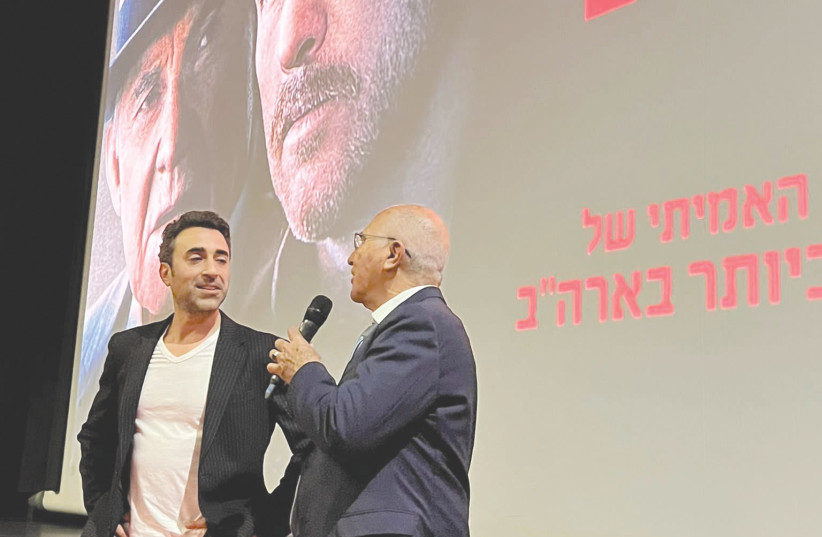Talking to the father and son duo, Robert Rockaway and Eytan Rockaway, who collaborated on the screenplay for Eytan’s recently released biopic, Lansky, starring Harvey Keitel (which is playing in theaters in Israel and on Amazon Prime Video around the world), is like taking a wild ride through the history of Jewish American gangsters.
Lansky is an engrossing movie about the life of legendary Jewish mob boss Meyer Lansky. It features Keitel, who plays the elderly mobster in Florida, being interviewed by a young journalist (Sam Worthingon), who is working on a biography of him. Lansky recalls his youthful exploits, which are told in flashbacks, and continues to play a cat-and-mouse game with the Feds, who are convinced he has hidden hundreds of millions of dollars.
Robert, a professor emeritus of Jewish history at Tel Aviv University, was born and raised in Detroit and moved to Israel decades ago. He is the author of several books, including But He Was Good to His Mother: The Lives and Crimes of Jewish Gangsters. Eytan, whose previous credits as a director include The Abandoned, grew up on his father’s stories of the Jewish mobsters who took a different route to achieve the American dream from most US immigrants.
Robert met Lansky and other mobsters while writing his book, but he said he knew such men when he was growing up.
“My mother was a beautiful woman who was widowed at 20, when my father got pneumonia and died. These guys dated her and she would introduce me to them,” he recalled. It turned out that quite a few of them were local wise guys, he said, and he grew up intrigued by Jews involved in crime.

When he became a historian, he was researching the Prohibition era and “a lot of Jewish names came up” when he looked at the illegal alcohol trade, so it was only natural for him to start to research Jewish criminals.
Some Jewish leaders cautioned him when he started to publish articles about the history of Jews in organized crime: “They told me, ‘You’re going to cause antisemitism.’” He said he felt that some in the Jewish community saw him as “this crazy guy who lives in Israel and who publicizes the Jewish mobsters... But, we have a history like every other group.”
Perceptions of Jewish gangsters have changed over time, the father and son said. “Decades ago, Jewish gangsters were heroes to most Jews,” said Eytan. “Italians and Irish would bully them when they first came to America and the Jewish gangsters would help them... People idealized them, there was an aura of fascination and admiration around them.”
Said Robert, “My perception is that people saw it as a badge of honor. These were Jews who fought against oppression. They were tough people. Meyer Lansky, he would say, ‘I never got on my knees for anybody.’”
However, he noted, “That doesn’t mean they didn’t rob Jewish peddlers. But, Lansky certainly never got on his knees for any Christian.”
Robert’s research led him to meet Lansky, who, even as an elderly man, cut an impressive figure. “When he came in, it was like the parting of the Red Sea. It was never Mr. Lansky, he said, ‘Call me Meyer.’ He knew who I was and what I was doing.” Lansky was familiar with the information in his FBI file, said Robert, and he was a straight talker. “He would say, ‘Never bluff anyone. I always tell the truth. I was always straightforward.’”
Eytan grew up hearing about Lansky. “I was fascinated,” he said. “I wanted to connect the dots... His story raised questions about good and evil, and the thin gray line between the two.” He conceived of a story about “the younger Lansky, who lived a vicious life, and an older man looking back at his life.”
Lansky’s philosophy is expressed in these lines from the film: “When you lose your money, you lose nothing. When you lose your health, you lose something. But when you lose your character, you lose everything.”
One aspect of Lansky’s life that the movie highlights was his determination to help Israel when the Jews of Palestine were fighting to build a state, by giving them money from his Cuban casinos. He settled in Israel in 1970, when he was fleeing prosecution and was disappointed when the Israeli government allowed the US to extradite him to stand trial two years later. “It was important to show scenes of his fight to stay in Israel,” said Eytan.
Not surprisingly, these father and son collaborators share Lansky’s dedication to family and portray the mobster caring for his special-needs son throughout his life in moving scenes that defy the tough-guy stereotype.
“The message of the movie,” said Eytan, “is that it all comes down to family.”
